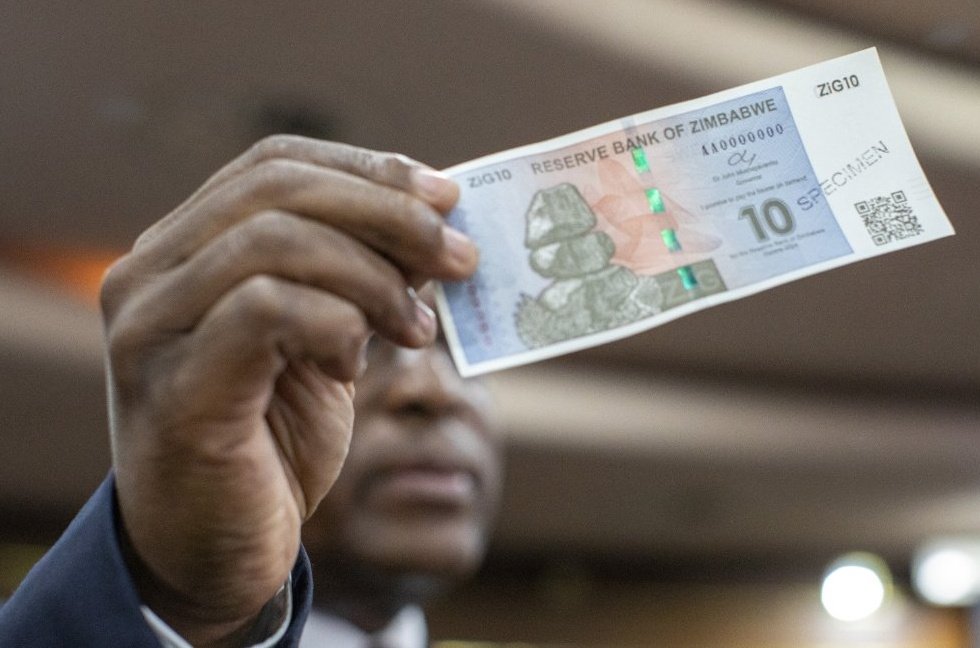Africa
Zimbabwe Launches New Gold-Backed Currency ZiG To Replace Dollar
It is the latest attempt to stabilise an economy that has lurched from crisis to crisis for the past 25 years.

Zimbabwe has introduced a new gold-backed currency called Zimbabwe Gold (ZiG) to replace it’s battered Zimbabwe dollar.
It is the latest attempt to stabilise an economy that has lurched from crisis to crisis for the past 25 years.
Unveiling the new notes, central bank governor John Mushayavanhu said the ZiG would be structured, and set at a market-determined exchange rate.
The ZiG replaces a Zimbabwean dollar, the RTGS, that had lost three-quarters of its value so far this year.
Annual inflation in March reached 55% – a seven-month high.
Zimbabweans have 21 days to exchange old, inflation-hit notes for the new currency.
However, the US dollar, which accounts for 85% of transactions, will remain legal tender and most people are likely to continue to prefer this.
The new ZiG banknotes come in denominations of between 1 and 200.
Coins will also be introduced to overcome the shortage of US coins, which has seen people receive change in sweets, small chocolates and pens.
Mushayavanhu said the new currency was being rolled out with immediate effect and banks must convert current Zimbabwe dollar balances to the ZiG.
He committed to ensuring that the amount of local currency in circulation was backed by equivalent value in precious minerals – mainly gold – or foreign exchange, in order to prevent the currency losing value like its predecessors.
Zimbabweans have a historic mistrust of the central bank, dating back to 2008, when it was printing Z$10tn notes while inflation had run out of control.
It then abolished its own currency and for many years only used foreign banknotes such as the US dollar and the South African rand.
In late 2016, the body introduced a new currency called the bond note that was backed by the US dollar loan facility. The then-central bank governor John Mangudya vowed it would remain on a par with the US dollar. But the bond note crashed when the government began printing excess money.
Promises have now been made by the central bank’s new governor that overprinting will not be allowed to happen again.
But public reaction on Friday to the latest currency reveal has been subdued.
“We now end up in the same place where we started – where assurances are being given to the market that the government will live within its means,” economist Godfrey Kanyenze told the BBC.
“The political culture has not changed – the critical point is discipline on the part of the authorities.”
The announcement of the new currency comes as the country is grappling with the effects of a serious drought, which has destroyed half of the country’s crop of the staple food, maize.
– BBC
Kenya Insights allows guest blogging, if you want to be published on Kenya’s most authoritative and accurate blog, have an expose, news TIPS, story angles, human interest stories, drop us an email on [email protected] or via Telegram
-

 Business2 weeks ago
Business2 weeks agobetPawa Empire Crumbles: Mr Eazi’s Betting Gambit Unravels Amid Partner’s Shadowy Deals
-

 Business1 week ago
Business1 week agoMinnesota Fraud, Rice Saga, Medical Equipment Deal: Why BBS Mall Owner Abdiweli Hassan is Becoming The Face of Controversial Somali Businessman in Nairobi
-

 News1 week ago
News1 week agoDCI Probes Meridian Equator Hospital After Botched Procedure That Killed a Lawyer
-

 Politics1 week ago
Politics1 week agoYour Excellency! How Ida’s New Job Title From Ruto’s Envoy Job Is Likely to Impact Luo Politics Post Raila
-

 Investigations2 weeks ago
Investigations2 weeks agoEXPOSED: SHA Officials Approve Higher Payments for Family, Friends as Poor Patients Pay Out of Pocket
-

 News1 week ago
News1 week agoKenya Stares At Health Catastrophe As US Abandons WHO, Threatens Billions In Disease Fighting Programmes
-

 Politics2 weeks ago
Politics2 weeks agoJaramogi Clan Tells Raila Jr, Winnie Against Disrespecting Their Uncle Oburu, Warns of Curses
-

 Business1 day ago
Business1 day agoCooking Fuel Firm Koko Collapses After Govt Blocks Sh23bn Carbon Deal
















